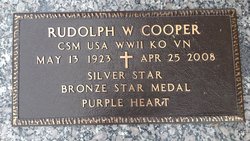Seed of Endurance by Rudy Cooper and Rosemary Wilkinson | Books in Review
 Sgt. Maj. Rudy Cooper earned three Combat Infantryman Badges—in the Second World War, Korea, and Vietnam—along with many wounds. None of his wounds was as traumatic as the damage he suffered when his main and reserve parachutes failed to deploy during a nine-hundred-foot jump. That happened just twelve days before his scheduled retirement.
Sgt. Maj. Rudy Cooper earned three Combat Infantryman Badges—in the Second World War, Korea, and Vietnam—along with many wounds. None of his wounds was as traumatic as the damage he suffered when his main and reserve parachutes failed to deploy during a nine-hundred-foot jump. That happened just twelve days before his scheduled retirement.
Cooper survived that fall. With Rosemary Wilkinson, he writes about his thirty years in the Army in Seed of Endurance: An Autobiography of SGM Rudy Cooper’s Military and Personal Life (Old Mountain Press, 285 pp., $20.00, paper).
I found the last third of Cooper’s book to be its most interesting. That’s where Cooper describes his almost continuous Southeast Asia service between 1965 and 1972. No regular U.S. combat units were in country when he reached Vietnam with the Special Forces in 1965. Americans were advisors to CIDG Strikers at Don Phuc, smack up against the Cambodian border, and on the Plain of Reeds, where Cooper worked.
The CIDGs’ task was to interdict Viet Cong forces. Cooper chose to accompany mainly night forays into the field rather than administrate. He operated from air boats, helicopters, and an O-1 Bird Dog. When necessary, he exceeded his advisory role to protect his own life or the lives of men lacking combat savvy. The missions found and destroyed a big VC aid station, a large-scale print shop for producing propaganda, and a mine and booby trap factory.
 Rudy Cooper spent 1967 in Thailand teaching counterinsurgency tactics to Thai soldiers. In 1969, he returned to Vietnam as part of MACV SOG, which conducted highly classified SF operations in Cambodia. In 1971, Cooper was sent to Lop Buri, Thailand, on a special assignment that paralleled clandestine CIA activities in Laos. For that clandestine job, personnel had no rank and wore civilian clothes.
Rudy Cooper spent 1967 in Thailand teaching counterinsurgency tactics to Thai soldiers. In 1969, he returned to Vietnam as part of MACV SOG, which conducted highly classified SF operations in Cambodia. In 1971, Cooper was sent to Lop Buri, Thailand, on a special assignment that paralleled clandestine CIA activities in Laos. For that clandestine job, personnel had no rank and wore civilian clothes.
All of which is not to say that Cooper had it easy in his previous two wars. For him, Vietnam produced many flashbacks to his experiences in Europe and Korea.
The Second World War actions of Cooper and his life-long friend Clarence Ruff reminded me of the plight of Bill Mauldin’s Willie and Joe. With the barest necessities and envious of their officers, Cooper and Ruff defeated better-armed German soldiers. With Ruff driving and Cooper manning a 37-mm gun and .50-caliber machine gun in an M-8 armored car, they shot everything in their path.
From 1943-45 as members of the 805th “Hellcats” Tank Destroyer Battalion, Cooper and Ruff fought across North Africa and then made an epic combat journey up the Italian peninsula: Anzio, Casino, Rome, the Po Valley. All the while, they maintained constant surveillance for wine and women, usually finding their share of both.
Disenchanted with post-war civilian life, Cooper enlisted in the Regular Army in 1947, and became a Counterintelligence Agent in Vienna. When the Korean War began, combat proved irresistible. In 1951, he took a short discharge and reenlisted for assignment with the infantry in Korea.
Cooper’s episodes about Korea are spellbinding. His writing captures the absolute nightmare of the impersonal dispersion of death. His Infantryman is a hopeless victim of violence, as well as a god emerging from virtually limitless destruction. Cooper’s descriptions of battle overwhelm the imagination. He damns the political machinations surrounding peace talks and labels them “a cruel addition to the war, ” providing momentary hope that repeatedly morphed into greater violence.
In the years between the Korean and Vietnam wars, Cooper often served as an administrator, a role he detested. Reflecting on the monotony of peacetime, he recalls the antics of bored SF troops, including pranks such as disrupting a retreat ceremony with booby-trapped trip wires and smoke grenades.
Rudy Cooper provides minimal details about his personal life. He was married to Rosemary Wilkinson, who is listed as the book’s co-author. They had two sons and two daughters. At early ages, the sons died in accidents.
Sgt. Maj. Rudy Cooper died in 2008, two years after he finished writing Seed of Endurance .
—Henry Zeybel
